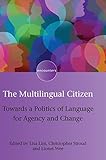TheMultilingual Citizen : Towards a Politics of Language for Agency and Change / ed. by Lisa Lim, Christopher Stroud, Lionel Wee.
Material type: TextSeries: EncountersPublisher: Bristol ; Blue Ridge Summit : Multilingual Matters, [2018]Copyright date: ©2018Description: 1 online resourceContent type:
TextSeries: EncountersPublisher: Bristol ; Blue Ridge Summit : Multilingual Matters, [2018]Copyright date: ©2018Description: 1 online resourceContent type: - 9781783099658
- 9781783099665
- 306.44/6 23/eng/20231120
- online - DeGruyter
| Item type | Current library | Call number | URL | Status | Notes | Barcode | |
|---|---|---|---|---|---|---|---|
 eBook
eBook
|
Biblioteca "Angelicum" Pont. Univ. S.Tommaso d'Aquino Nuvola online | online - DeGruyter (Browse shelf(Opens below)) | Online access | Not for loan (Accesso limitato) | Accesso per gli utenti autorizzati / Access for authorized users | (dgr)9781783099665 |
Frontmatter -- Contents -- Contributors -- Preface and Acknowledgements -- Introduction -- Part 1: Language Rights and Linguistic Citizenship -- 1. Linguistic Citizenship -- 2. Essentialism and Language Rights -- 3. Commentary – Unanswered Questions: Addressing the Inequalities of Majoritarian Language Policies -- Part 2: Educating for Linguistic Citizenship -- 4. Affirming Linguistic Rights, Fostering Linguistic Citizenship: A Cameroonian Perspective -- 5. Education and Citizenship in Mozambique: Colonial and Postcolonial Perspectives -- 6. Paths to Multilingualism? Refl ections on Developments in Language-in-Education Policy and Practice in East-Timor -- 7. Language Rights and Thainess: Community-based Bilingual Education is the Key -- 8. Commentary - Linguistic Citizenship: Who Decides Whose Languages, Ideologies and Vocabulary Matter? -- Part 3: Linguistic Citizenship in Resistance and Participation -- 9. Citizenship Theory and Fieldwork Practice in Sri Lanka Malay Communities -- 10. Linguistic Citizenship in Sweden: (De)Constructing Languages in a Context of Linguistic Human Rights -- 11. Linguistic Citizenship in Post-Banda Malawi: A Focus on the Public Radio and Primary Education -- 12. Making and Shaping Participatory Spaces: Resemiotization and Citizenship Agency in South Africa -- 13. Commentary - On Participation and Resistance -- Index
restricted access online access with authorization star
http://purl.org/coar/access_right/c_16ec
In this ground-breaking collection of essays, the editors and authors develop the idea of Linguistic Citizenship. This notion highlights the importance of practices whereby vulnerable speakers themselves exercise control over their languages, and draws attention to the ways in which alternative voices can be inserted into processes and structures that otherwise alienate those they were designed to support. The chapters discuss issues of decoloniality and multilingualism in the global South, and together retheorize how to accommodate diversity in complexly multilingual/ multicultural societies. Offering a framework anchored in transformative notions of democratic and reflexive citizenship, it prompts readers to critically rethink how existing contemporary frameworks such as Linguistic Human Rights rest on disempowering forms of multilingualism that channel discourses of diversity into specific predetermined cultural and linguistic identities.
Mode of access: Internet via World Wide Web.
In English.
Description based on online resource; title from PDF title page (publisher's Web site, viewed 25. Jun 2024)


